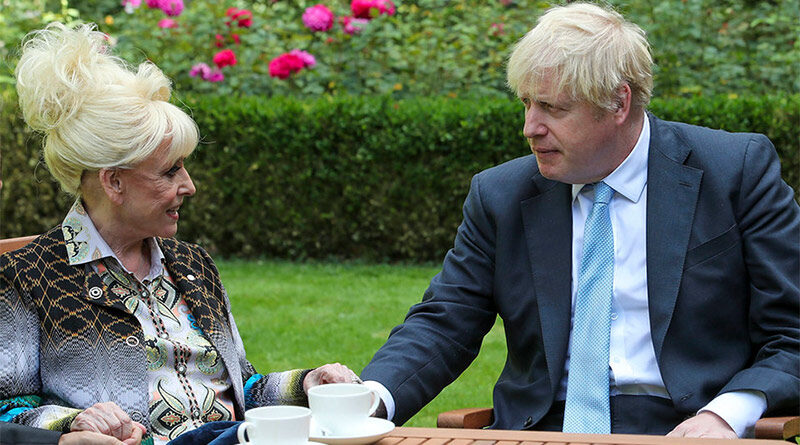Alzheimer’s Research UK Welcomes Government’s Recommitment to Dame Barbara Windsor Dementia Mission
The Government’s recommitment to delivering the Dame Barbara Windsor Dementia Mission has been warmly welcomed by Alzheimer’s Research UK, the UK’s leading dementia research charity.
Launched in August by Boris Johnson, the Dame Barbara Windsor Dementia Mission will help speed up dementia research and contribute to the Government’s goal of doubling research funding to £160m by 2024/25.
David Thomas, Head of Policy at Alzheimer’s Research UK, said:
“We campaigned heavily for government to accelerate efforts to develop much needed dementia treatments. So we are delighted to see the Government move forward with the Dame Barbara Windsor Dementia Mission. Now these promises need to be quickly turned into action, as the need to find life-changing treatments has never been more urgent.”
Part of the pledge will be to apply lessons from the success of the Covid Vaccine Taskforce to dementia research. For this to happen, industry, the NHS, academia and families living with dementia must come together to accelerate the breakthroughs that will transform the people’s lives.
Extra funding will also help boost the number of clinical trials and innovative research in the UK, accelerating the progress that’s urgently needed.
For this vision to happen, Alzheimer’s Research UK says the Government needs to focus on three priorities:
• Identify the most promising experimental drugs to take forward from the pipeline of potential dementia medicines.
• Create a network of high-performing clinical trial sites across the UK so these promising new dementia drugs can be quickly tested.
• Use the latest cutting-edge diagnostic tests to help match the right people to the right clinical trial at the right time.
The charity believes that, collectively, this will make the UK a more attractive location to run late-stage clinical trials in dementia.
David Thomas, Head of Policy at Alzheimer’s Research UK, continued:
“The UK has a rich heritage in dementia research. With the right action, the Dementia Mission, together with increased funding, will allow the UK to keep its place as a global leader in dementia research, bringing forward the changes that people with dementia desperately need.”
Dr Susan Kohlhaas, Director of Research at Alzheimer’s Research UK, said:
“Decades of painstaking research have finally brought new dementia treatments within reach. We’re now in an era where incredible breakthroughs for people with dementia will become a reality.
“The Dementia Mission gives us a huge opportunity to build on this momentum, but we need to make sure we have the investment in our clinical trials infrastructure so the most promising drugs can be delivered quickly to those who will benefit the most.”
Professor Jonathan Schott, Chief Medical Officer at Alzheimer’s Research UK, said:
“After many years of waiting, we are edging closer to new treatments that can alter the progression of Alzheimer’s disease and other forms of dementia, and make real differences to patients. Such advances are only made possible through research and volunteers who are willing and able to enter clinical trials.
“The UK has a rich history of research advances in dementia, but currently very few patients are offered the opportunity to participate in trials of new therapies. It is vital that the Dementia Mission addresses this urgently, providing the necessary infrastructure, personnel and access to diagnostic tests to maximise participation, and to match the right people to the right trials at the right time.”
Figures collated by Alzheimer’s Research UK earlier this year revealed shockingly low participation in late-stage dementia trials compared to other major health conditions.*
Josephine’s involvement in dementia research began after she was diagnosed with Primary Progressive Aphasia (PPA), a rare type of dementia that primarily affects speech and language, in 2011.
Josephine, a former senior civil servant, volunteered for research studies for several years to help scientists better understand PPA and speed up the search for treatments.
Her son, Will, is proud of his mum’s contribution to dementia research.
He said: “My mum is one of the most loving, caring people you could hope to meet. She has been living with a rare form of dementia for a while now and dealing with that has been challenging, to put it mildly.
“This disease has gradually destroyed her ability to communicate and to think. For someone so bright and with such a passion for language, education and debate, this has been very cruel.
“From her initial diagnosis and throughout her decline with this disease, Mum has had amazing support, particularly from my dad, who has been beyond amazing – patient, kind and always putting Mum first –and also the Frontotemporal Dementia Team at Addenbrooke’s looking after Mum in Cambridge.
“I’m proud that despite everything she’s been through my mum has made a huge contribution to help protect future generations by volunteering for research studies. She has put herself through years of psychometric testing and scans and has taken a number of drug combinations, knowing they may not help her, but that she’s hopefully helping others to avoid this disease in the future.”





